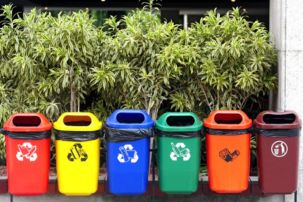Lesson summary
Students engage in a school waste audit to determine the quantities and makeup of the waste generated at their school. This baseline data is collected to calculate the total waste output of the school. Students investigate landfill, co-mingled recycling, paper and organic waste. Based on this data schools can explore how to reduce their waste.
Learning intentions:
Students will...
- collect data from a range of sources and calculate the total amount of solid waste produced by a school.
- understand that conducting a waste assessment is an easy and safe way to estimate the total amount of waste produced by a school, the number of bins around the school, the makeup of various types of bins and indications of contamination of recycling and food waste bins.
- learn that waste assessments can be repeated on a yearly basis, helping a school to track any changes. It is especially helpful in providing data that shows a reduction in solid waste following the introduction of a new waste system or education program.
Lesson guides and printables
Lesson details
Curriculum mapping
Australian curriculum content descriptions:
Year 7 Science:
- Some of Earth’s resources are renewable, but others are non-renewable (ACSSU116)
Year 7 Geography:
- Collect, select and record relevant geographical data and information, using ethical protocols, from appropriate primary and secondary sources (ACHGS048)
- Reflect on their learning to propose individual and collective action in response to a contemporary geographical challenge, taking account of environmental, economic and social considerations, and predict the expected outcomes of their proposal (ACHGS054)
Year 8 Science:
- Science and technology contribute to finding solutions to a range of contemporary issues; these solutions may impact on other areas of society and involve ethical considerations (ACSHE135)
Year 8 Mathematics:
- Choose appropriate units of measurement for area and volume and convert from one unit to another (ACMMG195)
Year 8 Geography:
- Collect, select and record relevant geographical data and information, using ethical protocols, from appropriate primary and secondary sources (ACHGS056)
- Reflect on their learning to propose individual and collective action in response to a contemporary geographical challenge, taking account of environmental, economic and social considerations, and predict the expected outcomes of their proposal (ACHGS062)
Year 9 Geography:
- Collect, select, record and organise relevant geographical data and information, using ethical protocols, from a range of appropriate primary and secondary sources (ACHGS064)
Year 10 Geography:
- Collect, select, record and organise relevant data and geographical information, using ethical protocols, from a range of appropriate primary and secondary sources (ACHGS073)
Cross curriculum priorities
Sustainability: OI.3 – Sustainable patterns of living rely on the interdependence of healthy social, economic and ecological systems.
OI.5 – World views are formed by experiences at personal, local, national and global levels, and are linked to individual and community actions for sustainability.
OI.9 – Sustainable futures result from actions designed to preserve and/or restore the quality and uniqueness of environments.
General capabilities
Numeracy, Critical and creative thinking
Syllabus outcomes: GE4-7, GE4-8, GE5-7, SC4-11PW, SC4-12ES.
Connecting lessons: Litter audit – must be completed as a compulsory action.
Resources required
- Writing materials
- Rubber gloves
- Camera or mobile phone with a camera or tablet device with a camera
- Access to a computer with a graphing program
- Map or plan of the school grounds
- Student worksheets
- Clipboard (if using printed copies of worksheet)
Additional info
This lesson can be used when working on the Waste Module of ResourceSmart AuSSI Vic Certification. By completing this lesson you will have completed the following actions:
Compulsory Actions:
- A1.1 – Have you undertaken waste audits at your school?
- A1.3 – Has this data been entered as your baseline, and any anomalies explained?
Checklist data goals:
- To find out how full the landfill and recycling bins/skips are when collected to measure actual waste output (in m3).
- To find out how much organic waste is processed by school (in m3) per year.


Welcome back!
Don't have an account yet?
Log in with:
By signing up to Cool.org you consent and agree to Cool's privacy policy to
store, manage and process your personal information. To read more, please see
our privacy policy here(Opens in new tab).
Create your free Cool.org account.
Many of our resources are free, with an option to upgrade to Cool+ for premium content.
Already have an account?
Sign up with:
By signing up to Cool.org you consent and agree to Cool's privacy policy to
store, manage and process your personal information. To read more, please see
our privacy policy here(Opens in new tab).